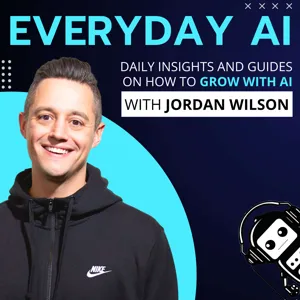Podcast Summary
Misunderstanding of AI use in classrooms: Despite a majority of students using generative AI for non-academic purposes, many teachers mistakenly believe that students are using it to write and submit papers, leading to potential misconduct and harm for students with disabilities.
The implementation of generative AI in classrooms has led to a significant mismatch between what students are actually doing and what teachers believe they're doing. This discrepancy can result in mistrust and an adversarial relationship between teachers and students. According to a new report from the Center For Democracy and Technology, while 58% of students have used generative AI for academic or personal reasons, only 19% have used it to write and submit a paper. However, 60% of teachers believe that students have done so. This misunderstanding can lead to chaos in the classroom and disproportionately impact students with disabilities, who are more likely to use generative AI and get in trouble as a result. With only a quarter of teachers receiving guidance from their schools on how to respond to suspected misuse, it's crucial that policies and practices around generative AI are reevaluated to prevent harm to protected classes of students.
Considering civil rights implications when implementing AI for student monitoring: Schools must prioritize protecting students' civil rights when deploying AI technologies for monitoring digital activity, especially in Title 1 schools and for students with disabilities.
Schools and school districts need to be aware of the potential civil rights implications when implementing AI technologies for monitoring student digital activity. Elizabeth Laird from the Center For Democracy and Technology emphasized this point, stating that existing civil rights protections should be considered to ensure AI deployment doesn't infringe on students' rights, particularly in Title 1 schools and for students with disabilities. The report co-authored by Elizabeth, which is available on marketplace tech dot org, reveals that schools monitor digital activity not only on devices issued by them but also on students' personal devices. This monitoring can have real-life consequences, including visits from law enforcement. As schools continue to implement AI technologies, it's crucial to prioritize protecting students' civil rights and ensuring these technologies are used ethically.
Learning about money through fun podcast episodes for kids: Million Bazillion podcast educates kids about complex money concepts in an engaging way, answering real-life questions and tackling intriguing topics.
The Million Bazillion podcast from Marketplace is an excellent educational resource for kids to understand complex concepts related to money. The podcast addresses the confusing questions kids have about finance in a fun and engaging way. Each episode tackles real-life inquiries from kid listeners, such as "What is a college account and how does it work?" or "What are unions and what are they for?" The podcast also touches on intriguing topics like the purpose of Fort Knox and its gold reserves. By listening to Million Bazillion, kids can gain valuable insights into how money functions in the world around them. Tune in to Million Bazillion on your favorite podcast platform to help your kids develop a solid foundation in financial literacy.




